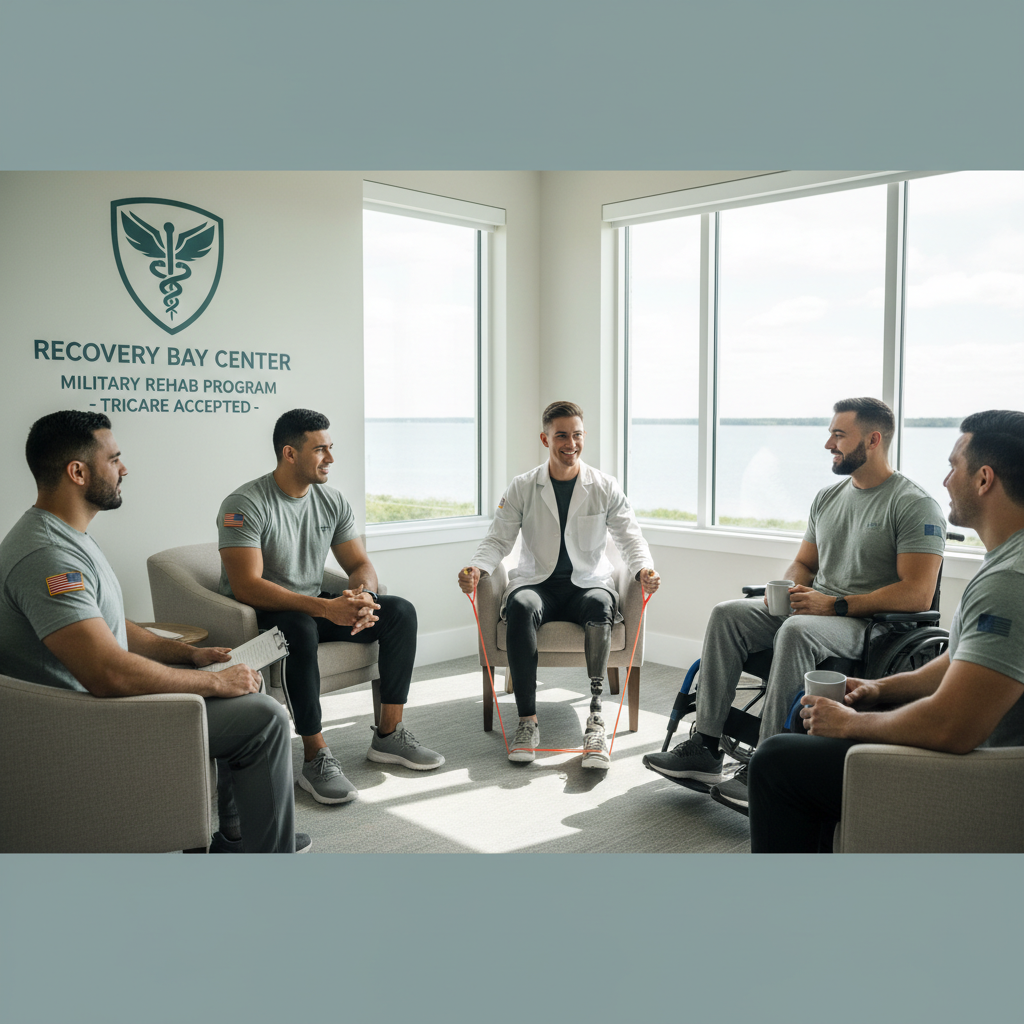Men-Only Rehab Programs Overview
Choosing a men-only rehab program offers several benefits. Such programs focus on issues specific to men, providing gender-targeted care and support in a conducive environment. In-network insurance coverage, including BCBS, is often available, easing the financial burden for quality treatment.
Benefits of Gender-Specific Treatment
Men-only treatment centers are evaluated to identify optimal options for addressing addiction and mental health issues, such as depression, anxiety, and trauma (Recovery.com). Gender-specific treatment offers several advantages:
- Tailored Programs: Men-only rehab centers provide programs that specifically address the unique challenges faced by men in recovery.
- Peer Support: Men in these programs often find it easier to relate to one another, fostering a sense of community and mutual support.
- Focused Interventions: Gender-specific interventions cater to men’s psychological, emotional, and social needs during recovery.
Some renowned men-only rehab centers include Soberman’s Estate, S2L Recovery, and Spero Men’s Recovery Center. These accredited centers offer specialized services to cater to men’s unique recovery needs.
In-Network Insurance Coverage
In-network insurance coverage eases the financial burden on families seeking treatment for their loved ones. Insurance plans like Blue Cross Blue Shield (BCBS) cover many men-only rehab programs. Knowing what is covered can help you make an informed decision.
| Center Name | BCBS Coverage | Programs Offered |
|---|---|---|
| Lighthouse Recovery Texas | Yes | Detox, Residential, Outpatient |
| Valley Bridge House | Yes | Residential, Outpatient |
| Healing Pines Recovery for Men | Yes | Holistic, Nature-Focused |
| Eagle Creek Ranch Recovery for Men | Yes | Diverse Therapies, Nature-Focus |
| Little Creek Recovery | Yes | Tech-Friendly, Specialized Care |
| Jaywalker Lodge | Yes | Specialized Care, Tech-Friendly |
For more information about BCBS coverage, read our detailed guide on mens residential addiction treatment covered by cigna.
Insurance Approval and Cost
Insurance approval can vary based on the policy and the specific treatments required. It’s recommended to verify details:
- Pre-Authorization: Confirm the policy’s requirement for pre-authorization.
- Co-Pays and Deductibles: Understand the out-of-pocket costs such as co-pays and deductibles.
- Coverage Specifics: Review what parts of the program are covered, such as detox, residential care, outpatient services, and post-rehab support.
Navigating insurance can be complex, but many rehab centers have specialists to help with this process. For a deeper dive into what BCBS covers, explore our article on bcbs in-network drug and alcohol treatment for men.
In conclusion, understanding the benefits of gender-specific treatment and in-network insurance coverage options like BCBS can significantly impact the success and affordability of a rehab program tailored for men. Take the time to explore options and secure the best care for lasting recovery. For additional insights, read about mens drug rehab covered by blue cross blue shield and other insurance-related queries.
Long-Term Rehab for Men
Duration and Outcomes
Long-term rehab programs cater to individuals who have struggled with addiction for a considerable period, have relapsed, or have co-occurring mental health and substance use disorders (American Addiction Centers). These programs offer a more extended and structured approach to recovery, significantly increasing the chances of lasting sobriety.
The duration of long-term rehab can vary, starting from 90 days to 6 months, and even extending to 1 or 2 years. Studies have shown that longer participation in treatment often yields better outcomes. For instance, attending a 6- or 12-month rehab not only improves the chances of staying sober but also allows individuals to practice essential coping skills, reducing the risk of relapse (American Addiction Centers).
| Duration | Expected Outcomes |
|---|---|
| 90 Days | Improved coping skills, initial habit formation |
| 6 Months | Higher chance of sustained sobriety, solidification of new habits |
| 1 Year | Long-lasting behavioral changes, reduced relapse rates |
| 2 Years | Comprehensive lifestyle overhaul, stable long-term recovery |
Care Levels and Services
Long-term rehab programs offer various levels of care and services tailored to meet the unique needs of each individual. Typically, these programs include a continuum of care that ensures a seamless transition through different stages of recovery. The following table displays the common levels of care and associated services:
| Level of Care | Services Provided |
|---|---|
| Inpatient Rehab | 24/7 medical supervision, detoxification, individual and group therapy |
| Residential Treatment | Structured environment, daily therapy sessions, recreational activities |
| Partial Hospitalization Program (PHP) | Day programs, medical monitoring, therapy, and counseling |
| Intensive Outpatient Program (IOP) | Flexible schedules, therapy sessions, support groups |
| Outpatient Services | Regular check-ins, counseling, and therapy on a less intensive schedule |
Many mens inpatient program in-network with bcbs cover long-term rehab, allowing for a tailored approach depending on the severity of addiction. Programs typically start with a comprehensive assessment to determine the appropriate level of care.
For individuals seeking residential rehab for men that accepts Tricare, long-term rehab is also available, offering extensive support and services. This approach ensures that all aspects of the individual’s addiction are addressed, including underlying mental health issues.
Access to long-term drug and alcohol rehab is typically covered by health insurance providers like BCBS. Approval length and cost depend on specific plan coverage (American Addiction Centers). For more information on how BCBS can support rehab treatment, visit our guide on mens drug rehab covered by blue cross blue shield.
Ohio Addiction Recovery Center, for example, is in-network with BCBS and offers coverage for various levels of treatment, from inpatient to telehealth counseling. This allows for a flexible and comprehensive treatment plan tailored to each individual’s needs.
Explore more about available rehab options through resources such as bcbs in-network drug and alcohol treatment for men and blue cross alcohol detox programs for men. These resources provide extensive information on insurance coverage and the variety of services offered.
BCBS Coverage for Men’s Rehab
Insurance Approval and Cost
Navigating the maze of insurance approval and costs for addiction treatment can be challenging. Blue Cross Blue Shield (BCBS) commonly covers a variety of addiction treatment services, including behavior therapy, medical detox, inpatient rehab, and outpatient programs. The extent of coverage depends on the specific BCBS plan you have.
BCBS generally covers most of the costs associated with substance abuse treatment, though policyholders may still have to pay out-of-pocket expenses such as co-pays, deductibles, or co-insurance. These additional costs can vary based on your specific BCBS plan.
| Cost Type | Potential Out-of-Pocket Expense |
|---|---|
| Co-pay | $20 – $50 per visit |
| Deductible | $500 – $2,000 annually |
| Co-insurance | 10% – 30% of total costs |
To confirm what your BCBS plan covers for men’s inpatient program in-network with BCBS, you should contact your insurance provider directly. They can provide detailed information regarding pre-approval requirements and coverage specifics. It’s also crucial to discuss these details with the treatment facility to ensure they are in-network and able to accommodate your insurance plan.
Treatment Options and Facilities
BCBS provides coverage for diverse treatment options and facilities tailored to your specific needs. Understanding these options can help you choose the best facility for yourself or a loved one.
Residential Rehab
Residential rehab programs, which offer a structured and supportive environment, are often the best choice for severe addiction cases. These facilities provide 24/7 care, professional supervision, and a range of supportive services including individual therapy, group counseling, and medication management (American Addiction Centers). BCBS typically covers residential rehab, but policies vary, so verifying coverage is essential.
For a more comprehensive understanding of what BCBS covers in a residential setting, check our section on mens residential addiction treatment covered by cigna.
Medical Detox
Detox is a crucial step in the addiction recovery process, especially for substances that can cause life-threatening withdrawal symptoms. BCBS usually covers medical detox services, ensuring that detoxification is performed under medical supervision to safely manage withdrawal symptoms (Ohio Addiction Recovery Center). More details on coverage can be found in our guide on bcbs approved detox for men.
Outpatient Programs
Outpatient rehab programs are also covered by BCBS for those who require treatment but cannot commit to a full-time residential program. Outpatient programs allow individuals to maintain their daily responsibilities while receiving addiction treatment. These programs are ideal for those with less severe addiction issues or as a step-down from a residential program.
To explore more about outpatient services, see our article on residential rehab for men that accepts tricare.
| Treatment Type | Typical Coverage by BCBS |
|---|---|
| Residential Rehab | Majority Coverage (Varies by Plan) |
| Medical Detox | Full to Majority Coverage |
| Outpatient Programs | Majority Coverage (Varies by Plan) |
For detailed information on the nuances of BCBS coverage for men’s rehab programs and to ensure you are making the best financial and health-related decision, explore related articles on mens residential drug rehab blue cross blue shield and bcbs in-network drug and alcohol treatment for men.
Importance of Comprehensive Care
Addressing substance use disorders in men requires a multifaceted approach. Comprehensive care ensures treatment addresses not only the addiction but also the underlying mental health conditions and employs proven therapies.
Mental Health Co-Occurring Disorders
Many individuals struggling with addiction also face mental health co-occurring disorders. Conditions such as depression, anxiety, PTSD, and bipolar disorder are common among those seeking treatment. It’s crucial to identify and treat these co-occurring disorders simultaneously for effective rehabilitation.
Statistics indicate:
| Disorder | Prevalence Among Those with Substance Use Disorders |
|---|---|
| Depression | 30% |
| Anxiety | 40% |
| PTSD | 25% |
| Bipolar Disorder | 20% |
Effective treatment programs incorporate:
- Dual diagnosis management
- Integrated therapy sessions
- Specialty care for complex cases
For men seeking specialized care, it’s important to ensure that their mens inpatient program in-network with BCBS provides the necessary resources for mental health interventions.
Evidence-Based Therapies
Successful recovery programs leverage evidence-based therapies, which are scientifically proven to be effective in treating addiction. These therapies typically include:
- Cognitive-Behavioral Therapy (CBT): Focuses on altering negative thinking patterns and behaviors. CBT is instrumental in managing both the addiction and co-occurring mental health conditions (NCBI Bookshelf).
- Motivational Interviewing (MI): Encourages individuals to find the motivation within themselves to make positive changes.
- Medication-Assisted Treatment (MAT): Uses medications in combination with counseling and behavioral therapies to treat substance use disorders.
In long-term rehab programs, services typically provided include:
| Service | Description |
|---|---|
| Individual Counseling | One-on-one sessions with a therapist to address personal issues and goals |
| Group Counseling | Peer support and therapy facilitated by a counselor |
| Family Counseling | Therapy sessions including family members to improve communication and support |
| Vocational Support | Programs to aid in job readiness and employment |
| Legal Support | Assistance with legal issues related to substance use |
For a comprehensive list of services covered by BCBS, refer to mens addiction treatment covered by bcbs insurance.
In summary, comprehensive care in men’s rehab programs ensures that all aspects of addiction and related issues are addressed. Such thorough approaches increase the chances of long-term recovery and improved quality of life. For more on different treatment options and facilities, explore mens inpatient rehab covered by ambetter insurance.
Support Groups in Men’s Recovery
Psychoeducational Group Benefits
Psychoeducational groups play a crucial role in the recovery process for men involved in mens inpatient programs in-network with BCBS. These groups are structured to educate clients about substance abuse, related behaviors, and the consequences of addiction. They use a variety of methods such as tapes, lectures, and discussions to convey information.
Benefits of psychoeducational groups include:
- Self-Awareness: Helping clients understand the impact of their substance use on their lives and others.
- Growth Options: Providing information about healthy behaviors and lifestyle changes.
- Community Resources: Identifying resources available in the community to support recovery.
- Guidance: Offering direction and insight into the recovery process.
- Action Steps: Encouraging clients to take actionable steps towards self-improvement.
For more information about integrating psychoeducational groups in a treatment plan, take a look at our articles on mens drug rehab covered by Blue Cross Blue Shield and mens residential addiction treatment covered by Cigna.
Skills Development Group Focus
Skills development groups, operating primarily from a cognitive-behavioral orientation, aim to equip clients with essential coping skills necessary to achieve and maintain sobriety. These groups are particularly beneficial for men in mens inpatient programs in-network with BCBS, as they provide practical tools for daily life.
Key focus areas of skills development groups include:
- Refusal Strategies: Training clients on how to refuse substances in various social situations.
- Trigger Avoidance: Identifying and avoiding situations or behaviors that may trigger substance use.
- Anger Management: Techniques for managing anger and reducing stress to prevent relapse.
- Problem-Solving: Effective strategies for solving everyday problems without resorting to substance use.
- Relaxation Techniques: Methods for relaxation and stress reduction to support mental well-being.
For additional insights on incorporating skills development groups into recovery programs, check out our resources on inpatient detox for men with Ambetter and cigna approved inpatient drug rehab for men.
By integrating these support groups, men in recovery can develop a robust set of tools that enhance their ability to maintain long-term sobriety.
Treatment Settings for Men
Finding the right setting for substance abuse treatment is crucial for successful recovery. This is especially true in male-focused environments that are in-network with BCBS (Blue Cross Blue Shield). There are various treatment settings available; understanding the differences can help you choose the most suitable option for your loved one.
Inpatient vs Outpatient Programs
Inpatient Programs:
Inpatient hospitalization for substance abuse treatment involves around-the-clock care and supervision by a multidisciplinary staff. This setting is usually restricted to severe cases including severe overdoses, severe withdrawal syndromes, psychiatric comorbidity, and acute substance dependence with a history of nonresponse to other forms of treatment (NCBI Bookshelf). In these programs, patients receive intensive support and medical attention in a controlled environment.
Outpatient Programs:
Outpatient treatment involves scheduled attendance of less than 9 hours per week. Programs vary from ambulatory methadone maintenance to drug-free approaches, requiring patients to have support systems in place, adequate living arrangements, and transportation to services (NCBI Bookshelf). Outpatient settings are less intensive and provide more flexibility, making them suitable for individuals who have strong social support and a lower risk of severe withdrawal symptoms.
Residences and Outpatient Services
Residential Treatment Facilities:
Residential treatment facilities with 24-hour supervision are ideal for individuals facing overwhelming substance use problems who lack motivation or social support to stay abstinent (NCBI Bookshelf). These programs range from long-term therapeutic communities to less supervised settings for transitioning back into the community. Residential treatment offers a structured environment where men can focus entirely on their recovery, away from potential triggers and distractions.
Intensive Outpatient Programs (IOPs):
Intensive outpatient treatment typically requires a minimum of 9 hours of weekly attendance and is often recommended for patients in the early stages of treatment or transitioning from residential or hospital settings (NCBI Bookshelf). This setting provides more structure than less intensive outpatient programs and often includes individual therapy, group counseling, and family therapy sessions.
Standard Outpatient Programs:
Standard outpatient programs involve fewer than 9 hours of therapy per week and can include various services to meet individual needs (NCBI Bookshelf). These programs are typically used for primary intervention efforts, extended aftercare, and follow-up. The less structured nature of these programs makes them suitable for individuals who have completed more intensive treatment or those with less severe substance use issues.
| Treatment Setting | Weekly Attendance | Supervision Level | Ideal For |
|---|---|---|---|
| Inpatient | 24/7 | High | Severe cases with comorbidities |
| Residential | 24/7 | High | Severe cases with low social support |
| Intensive Outpatient (IOP) | Min 9 hours | Moderate | Early stages or post-residential |
| Standard Outpatient | < 9 hours | Low | Follow-up or primary intervention |
Each of these settings has its own advantages and challenges. Understanding these can guide you in choosing the best setting for your loved one’s recovery journey. To further explore the specifics of various treatment options and find one that aligns with BCBS coverage, you can read more about mens inpatient substance use treatment with bcbs or related topics such as mens drug rehab covered by blue cross blue shield.





